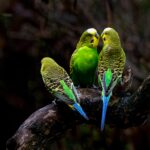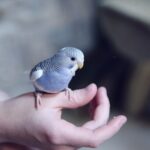For the bird enthusiasts among us, diving into the dietary delights of canaries and finches can be a feast of fun. Hold onto your bird seeds, and let’s embark on this avian adventure.
Understanding Avian Appetites
When it comes to feeding our feathered friends, it’s not a one-size-fits-all affair. Understanding the palate of these petite songbirds is essential. Their appetites are shaped by both their genetics and the environment. Thus, while wild birds might feast on a certain variety of foods due to availability, our domestic companions rely on us to ensure their nutritional needs are met.
Importance of Diet Variety
Diet variety isn’t just for us humans. Canaries and finches also crave a buffet of foods. A mix ensures they get essential nutrients and keeps mealtime interesting. Imagine eating the same meal every day. Boring, right? Just like us, they prefer a varied menu. This not only keeps them excited about their meals but also ensures they receive a balanced diet filled with the nutrients essential for their wellbeing.
Nutritional Needs
Like us after a gym session, these birds need their protein and vitamins. Their diet should support their vibrant energy levels and melodious singing. Proteins help in muscle development, whereas vitamins and minerals are essential for various physiological functions. It’s also worth noting that canaries and finches have high metabolism rates. This means their energy requirements are significant, demanding a diet that’s rich and varied.
Wild vs. Domestic Differences
Domestic birds rely on us, while their wild counterparts pick and choose. Yet, their dietary base remains pretty consistent. Wild birds might have access to a broader range of insects, seeds, and fruits, depending on their habitat. Domesticated birds, however, have their menu determined by their caregivers, which should ideally mirror what they would find in their natural habitat as closely as possible.
Avoiding Overfeeding
They may be small, but they sure can eat! However, moderation is key. Overfeeding can lead to health issues such as obesity, which in turn can lead to other complications. Being observant and knowing when and how much to feed is crucial for their overall health.
Seed Delights
- Canary Seed Mix: This is a blend of various seeds tailored to meet the specific needs of canaries. It’s a staple, yet not the only food source they need.
- Millet: A favorite among many birds, millet is packed with nutrients. Both birds are fans. Think of it as the birdie version of chocolate – but way healthier!
- Rapeseeds: These seeds are a great source of energy. Packed with proteins and minerals, they’re essential for their daily activities.
- Linseed: Want your bird to have a glossy and shiny coat of feathers? Linseed is your go-to seed, providing those essential oils that give them that beautiful plumage shine.
Fresh Foods They Adore
It’s not just about seeds. Fresh foods play a significant role in their diet, providing vital vitamins and minerals that might not be present in seeds.
Safe Fruits and Veggies
- Apples and Oranges: They love them! However, ensure they’re given in moderation, and always without seeds as they can be harmful.
- Broccoli and Spinach: Packed with vitamins, these greens are a must. And yes, even birds eat their greens!
- Peas and Carrots: These are not just for humans. They provide essential nutrients and are a delight for our avian buddies.
Occasional Treats
Who doesn’t love a treat? From small insects to special seeds, canaries and finches have their list of favorite snacks. However, as with all treats, they should be given occasionally and in moderation.
Avoid These Foods
- Chocolate: This is a strict no. It’s toxic and can be lethal to these birds.
- Avocado: Another dangerous food, avocado contains a substance that’s harmful to many birds. So, it’s a definite no-no for these birdies.
Supplementing Their Diet
Just like humans take vitamins to boost their health, birds can benefit from dietary supplements too. Supplements ensure that any nutritional deficiencies in the bird’s diet are addressed, promoting overall health and well-being.
Mineral Blocks
These are essential additions to a bird’s cage. Mineral blocks provide necessary minerals like calcium, which are indispensable for bone health and the formation of strong beaks and nails. Besides, they play a crucial role in digestion by helping birds grind down their food.
Calcium Supplements
Canaries and finches need calcium for more than just strong bones. For those that lay eggs, adequate calcium intake is vital for proper eggshell formation. A lack of calcium can lead to weak shells or even egg binding, a condition where the bird struggles to lay the egg. Offering calcium supplements or cuttlebones can prevent these issues.
Vitamin Drops
Not all bird diets provide the comprehensive range of vitamins they need, especially if they’re on a seed-only regimen. Vitamin drops can be added to their water or sprinkled on their food, ensuring they get their daily dose of vital nutrients. This is especially beneficial for birds that are reluctant to eat fresh fruits and veggies.
Probiotics
A healthy gut is key to overall health. Probiotics help maintain the balance of good bacteria in the bird’s digestive system, promoting efficient digestion and preventing diseases. With the importance of gut health in humans gaining traction, it’s worth noting that our feathered friends also benefit significantly from a balanced intestinal flora.
Feeding Tips and Tricks
Birds, with their quirky personalities and habits, can sometimes be picky eaters. Here are some tips to ensure mealtime remains an exciting and nutritious event.
Regularly Change Water
Water isn’t just for hydration. It plays a role in digestion and nutrient absorption. Ensuring birds always have access to fresh water is crucial. During hot days, they might drink more than usual, so it’s essential to check their water supply frequently and refill as necessary.
Clean Feeders
Cleanliness is next to birdie happiness. No bird wants to eat from a dirty feeder, just as we wouldn’t enjoy a meal on a soiled plate. Regular cleaning prevents the growth of mold and harmful bacteria, ensuring your birds remain in peak health.
Observe Their Preferences
Every bird is an individual with its own likes and dislikes. Some might relish spinach leaves, while others might leave them untouched. Observing what they eat and adjusting their diet accordingly ensures they get a mix of all essential nutrients.
Limit Treats
Treats are called treats for a reason. They’re meant to be occasional delights, not regular staples. Overindulging can lead to health problems like obesity, so it’s vital to offer treats sparingly.
Conclusion
Nurturing our feathered companions requires more than just a casual scatter of seeds. It’s about understanding their needs and preferences, much like how we cater to the diverse tastes within our family. Whether you’re an avid bird watcher or a proud pet owner, knowing how to properly feed canaries and finches ensures their longevity and well-being. These songbirds, with their melodious chirps and vibrant colors, not only beautify our homes but also our lives. And with the right dietary approach, they’ll continue to thrive, adding a touch of nature’s symphony to our daily lives. So next time you see them eyeing that broccoli stem or bobbing their heads excitedly at the sight of millet, remember: it’s a testament to their enriched diet and your dedicated care.
FAQs
- Q: Can I feed my canary fruits daily?
A: While fruits are nutritious and loved by many birds, moderation is essential. It’s recommended to offer fruits as an occasional treat rather than a daily staple to ensure a balanced diet. - Q: Are there any toxic foods I should be aware of?
A: Absolutely. Some foods that are perfectly safe for humans can be toxic to birds. Chocolate and avocado are two prime examples that should never be given to canaries or finches. It’s also essential to remove seeds from fruits like apples, as they can be harmful. - Q: How often should I clean the feeders?
A: Cleanliness ensures the health of your bird. Feeders should be cleaned at least once a week to prevent mold and bacterial growth. However, if you’re providing fresh foods, cleaning daily is recommended to remove any leftovers that could spoil. - Q: Is tap water safe for my finch?
A: While tap water is often treated and deemed safe for human consumption, it might contain minerals or chemicals that aren’t ideal for birds. Providing filtered or dechlorinated water is a safer choice to ensure the health of your finch. - Q: Can I feed my birds human snacks?
A: It’s best to avoid human snacks. Many of our snacks contain ingredients like salt, sugar, and artificial additives that aren’t suitable for birds. Stick to bird-approved treats and foods to keep them healthy and happy.





